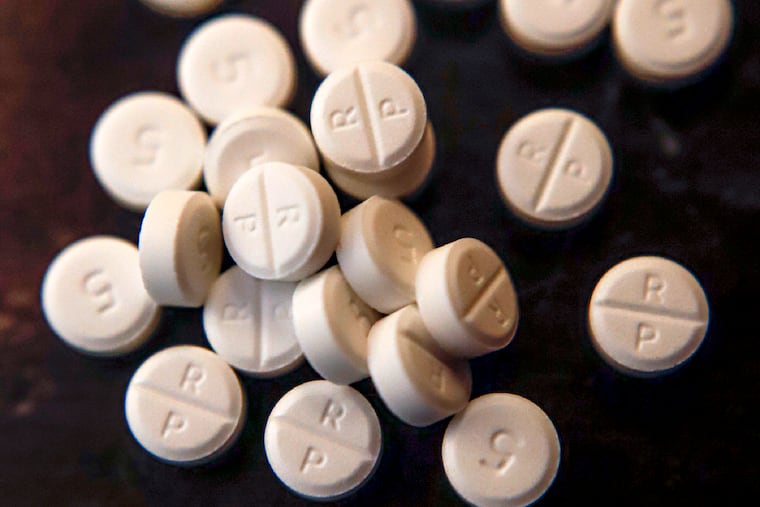Justice Dept. sues AmerisourceBergen, accusing it of fueling the opioid epidemic
The Conshohocken-based company accuses the department of cherry-picking the pharmacies it cited in the lawsuit

The Department of Justice has filed a civil suit against Conshohocken-based AmerisourceBergen, one of the largest wholesale pharmaceutical distributors in the country, and two of its subsidiaries for failing to report suspicious opioid orders to federal law enforcement, which authorities contend contributed to the opioid epidemic.
The company failed to report at least “hundreds of thousands” of suspicious orders from 2014 to the present, according to the department. If found liable, the company could be forced to pay billions in civil penalties.
The complaint was filed in the U.S. District Court for the Eastern District of Pennsylvania and alleges AmericsourceBergen violated the Controlled Substances Act, which requires companies to monitor controlled substance orders for any irregularities that signal they’re being diverted for illegal use.
The complaint is the latest in a wave of federal and state lawsuits aimed at holding opioid manufacturers accountable. States like Pennsylvania, where more than 5,000 people died of opioid overdoses last year, continue to feel the effects of the proliferation of opioids over the last decade, and payouts from these suits are slated to help fund addiction treatment in hard-hit communities.
» READ MORE: A $63 million opioid-lawsuit settlement will help Delaware County’s addiction services, Shapiro says
Earlier this year, AmerisourceBergen joined two other distributors to pay up to $19.5 billion over 18 years — with AmericsourceBergen paying about $6.1 billion— to thousands of communities across 46 states and the District of Columbia in a settlement over claims they fueled the opioid crisis. Pennsylvania could get up to $1 billion from the settlement.
The Justice Department claims the pharmaceutical distributor underfunded compliance programs meant to handle the reporting of suspicious orders. What’s more, instead of having the company’s compliance arm process questionnaires meant to determine whether a pharmacy was suitable for selling controlled substances, AmerisourceBergen allowed sales representatives to collect forms and communicate with potential clients regarding them. The complaint argues sales employees faced a conflict of interest because they were incentivized to recruit and keep customers.
“AmerisourceBergen was required by law to report suspicious orders to the DEA, and they failed in their obligation to do so,” Susan A. Gibson, special agent in charge of the DEA’s New Jersey Division, said in a statement. “This failure contributed to the opioid epidemic that has plagued this country for years.”
In a statement, AmerisourceBergen said the Department of Justice cherry-picked the five pharmacies it described in the lawsuit and accused the agency of failing to take action itself regarding those pharmacies.
In one instance described in the lawsuit, the subsidiaries AmerisourceBergen Drug Corp. and Integrated Commercialization Solutions LLC were shipping “skyrocketing” opioid orders to a closed-door, mail-order independent pharmacy in Fort Lee, N.J. The subsidiaries ignored other signs of diversion, including the fact that more than 60% of the pharmacy’s purchases were controlled substances, according to the suit. At one point in 2018, the company’s regulatory arm wrote the pharmacy to terminate the sale of controlled substances, only to later reverse course.
Reacting to the news, executives from one of the subsidiaries exchanged emails that read “Great news!” and “SELL. ... SELL. ... SELL!!!!!”
In the case of a Trenton pharmacy, AmerisourceBergen’s regulatory arm approved sales despite anticipated purchases of “incomprehensible amounts of oxycodone, hydrocodone, and methadone,” the suit says. By late 2015, the Trenton pharmacy would become AmerisourceBergen Drug Corp.’s largest customer for oxycodone solids in the state. In May, the pharmacist in charge was indicted for illegally distributing opioids.
And in Beckley, W.Va., AmerisourceBergen Drug Corp. failed to report an independent pharmacy to federal regulators despite receiving reports from an outside auditor of drug deals taking place in the pharmacy’s parking lot, according to the suit. The subsidiary is also accused of ignoring its regulatory arm’s May 2015 recommendations to “consider severing the pharmacy’s ability to purchase controlled substances,” instead shipping close to half a million dosage units of controlled substances to the pharmacy in the nearly six months that followed.
One AmerisourceBergen vice president would later describe the parking lot deals as “the reddest of red flags,” the suit says.
“For years, AmerisourceBergen put its profits from opioid sales over the safety of Americans,” said U.S. Attorney for the District of New Jersey Philip R. Sellinger in a statement, adding the examples listed were not isolated incidents but signs of “widespread misconduct.”
AmerisourceBergen’s statement said the company terminated its relationships with four of the five pharmacies described before the Drug Enforcement Administration took any action, and two of the pharmacies maintain their ability to dispense controlled substances.
The company also pointed to a federal judge’s July ruling that found AmerisourceBergen and two other drug distributors didn’t cause a public nuisance in Cabell County, W.Va., through the sale of controlled substances.
“This sweeping decision addressed many of the same accusations that are made in this DOJ complaint while acknowledging the role of the DEA in controlled substance distribution with tools like manufacturing quotas — ultimately concluding that AmerisourceBergen had complied with the law,” said the company’s statement.